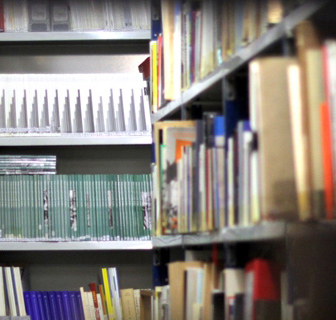Auschwitz Foundation Library Rules
The library is open to the public from Monday to Friday from 9.30 a.m. to 4 p.m.
It is obligatory to make an appointment with the Auschwitz Foundation librariy Manager, Mr Verschueren, by telephone on +32 (0)2 512 79 98 or, preferably, by e-mail, in order to optimally prepare the visit and the documentation to be consulted.
REGISTRATION
Registration is free and compulsory. It is carried out on presentation of your identity card. The reader is asked to fill in a form with his or her ID number, contact details and the purpose of the visit.
Registration implies that the reader is aware of and accepts these rules, which can be consulted on site and obtained on request.
If the reader is a minor, his/her parents or legal guardian are responsible for any loss or damage to the documents.
CONSULTATION
Consultations are free of charge.
Library readers shall be quiet, refrain from smoking, eating, drinking and using mobile phones inside the library. The use of a laptop is allowed.Repeated violations of these instructions may lead to a ban on access to the library premises.
A computerised catalogue of the library's collections is available to assist readers in their research.
The desired documents must be requested from the librarian (there is no open access to the library).
Readers shall handle consulted or borrowed documents with care, refraining from any annotation, underlining or other deterioration of any kind.
It is strictly forbidden to take documents out of the library without informing the librarian. When leaving the library, readers should spontaneously check the documents they take with them.
Any theft or attempted theft may result in a criminal complaint.
PHOTOCOPIES
Documents can be photocopied in black and white at a cost of €0.05 for an A4 copy and €0.07 for an A3 copy. Student work (theses, dissertations, etc.) may not be photocopied without the written permission of the author.
We remind visitors that photocopying a complete work is prohibited by law.
LOAN
Loans are allowed (with some exceptions: reference books, art books, precious books, etc.) and are free of charge.
Loans do not apply to student work.
A reader can borrow a maximum of three documents at a time.
The loan period is two weeks.
Readers are responsible for the documents they borrow.
At the time of borrowing, the reader must inform the librarian of any damage to the document. If no damage is found at that time, the reader is assumed to have received the book in good condition.
EXTENSION
An extension of two more weeks may be granted. The reader must contact the library to request it (by phone or e-mail). A document will not be extended if it has been reserved by another reader or if the reader has overdue documents.
LATE RETURNS
Any document returned after the loan deadline is considered late (without justification). As long as the reader has not returned the overdue document, his or her lending right is suspended. A fine will be charged to the reader in the case of a late return.
The reader will be required to reimburse any reminder costs incurred (mail, etc.).
Failure to respond to complaints and to return the requested documents may result in legal action being taken.
LOSS AND DETERIORATION
In the event of loss or damage of a document, the reader must reimburse the document at the current price. An administrative fee may be charged.
>If the document is no longer available for sale, the Auschwitz Foundation will estimate the value of the loss as compensation.
RESERVATION
Any reader can reserve a book already borrowed. He/she then has the priority to borrow it on its return.
EXCEPTIONAL MEASURES
The Auschwitz Foundation management may grant exceptions to this regulation upon reasoned request and cancel the facilities it has granted at any time.

The Library
The Auschwitz Foundation makes a multilingual library with over 15,000 books available to the general public. The books and periodicals relate to the study of the Second World War (particularly in Belgium, France and the Netherlands), Fascism, National Socialism and the Third Reich (history, movements, regimes, institutions, society, economy, ideologies, etc.) as well as to all dimensions of Fascist and Nazi criminality (political repression, racial persecutions, medical experiments, war crimes, genocidal politics, etc.). The genocides of the Jews and Roma perpetrated by the Nazis are widely represented.
We possess extensive documentation on extermination centres and concentration camps.
Many books also deal with the history of anti-fascism, anti-Nazism and the Resistance in Europe.
More theoretical and methodological themes are also covered: the relationship between history and memory, the use of testimonies and oral history, the validity of comparative approaches, the great historiographical debates and controversies on the interpretation of totalitarian, fascist, Nazi and Stalinist phenomena, etc.
In addition, the Auschwitz Foundation library offers readers educational books, numerous testimonies and significant novels about the Shoah.
The collections also include works on racism, anti-Semitism, xenophobia and their resurgence, and on Holocaust denial today.
Other mass crimes and genocides, from the Armenians to Rwanda to the former Yugoslavia, etc., are also found among the works in our collection.
A computerised catalogue of books and periodicals is available to readers and can be consulted on site.
By appointment, the scientific staff of Remembrance of Auschwitz are available to guide readers in their research.
The library is open to the public from Monday to Friday from 9.30 a.m. to 12.30 a.m. and from 1.30 p.m. to 4.30 p.m., only after making an appointment with the library manager, Mr Verschueren, by e-mail.
Registration is free and compulsory. Consultations are free of charge. Some of the documentation can be borrowed for a fortnight. A4 photocopies can be produced for €0.05.
Access to the library and its documentation is subject to general reading regulations.
The Archive Collections
Since its creation in 1980, the Auschwitz Foundation has undertaken to collect all types of archival documents relating to the Nazi concentration camp world and the situation of deportees and survivors. This collection of archives is motivated by the desire to preserve as many traces as possible, but it also aims to gather a large amount of documentation for scientific research or any type of educational process.
The archives are accessible from Monday to Friday from 9.30 a.m. to 12.30 a.m. and from 1.30 p.m. to 4.30 p.m., by appointment only with the archives manager, Ms Timperman by e-mail.
The Auschwitz Foundation has a number of archive collections, including:
- A photo library consisting, on the one hand, of photos relating to the activities of the Amicale d'Auschwitz and the Auschwitz Foundation (trips, seminars, etc.) and, on the other hand, of photographic prints relating to the Second World War (Belgium under occupation, the Third Reich, concentration camps and extermination centres, etc.); these are reproductions from the main museums or renowned study centres;
- the archives of the Amicale Belge des Ex-Prisonniers Politiques d’Auschwitz-Birkenau: current archives of the Amicale such as correspondence, activity programmes, minutes of meetings, organisation of events, etc.;
- the archives of the International Auschwitz Committee: publications, minutes, balance sheets, articles of association, correspondence with national committees, etc.;
- the Personal Papers of Victims of Nazi Crimes and Genocides collection: these include membership cards, identification cards, deportation cards, official acknowledgements, correspondence, certificates and declarations of incarceration, photographs, press cuttings, drawings, etc.; the latter collection is mainly made up of documents supplied by survivors following their audiovisual interviews.
As the Belgian branch of the Fortunoff Video Archive for Holocaust Testimonies of Yale University, the Auschwitz Foundation has been collecting testimonies of camp survivors in the form of audiovisual interviews since 1992. These interviews are life stories in which the witness tells his or her story before, during and after deportation. The recordings are accompanied by a biographical sheet containing factual information about the witness’ life. In addition, a number of these interviews are thematically indexed (with reference to the ‘time-code’ and sequenced to facilitate research. To date, the Foundation has collected 246 interviews representing almost 1,250 interview hours. The average length of the interviews is 5 hours 10 minutes.
http://fortunoff-testimonies.be/
Contact
Auschwitz Foundation – Remembrance of Auschwitz
Rue aux Laines 17 box 50 – B-1000 Brussels +32 (0)2 512 79 98
+32 (0)2 512 79 98 info@auschwitz.be
info@auschwitz.be
BCE/KBO Auschwitz Foundation: 0876787354
BCE/KBO Remembrance of Auschwitz: 0420667323
Office open from Monday to Friday 9:30am to 4:30pm.
Visit only by appointment.
![]()
![]()
![]()
![]()
![]()
Become a member
To become a member of Remembrance of Auschwitz ASBL, please contact us and transfer the sum of €50.00 to our account IBAN: BE55 3100 7805 1744 – BIC: BBRUBEBB with the communication: ‘Membership fee 2025’. The membership includes two issues of 2025 of our scientific journal.
DONATIONS
Donations of €40.00 or more (in one or more instalments) qualify for tax exemption for Belgian taxpayers.
In communication, please specify that it is a ‘Donation’ and mention your National Number which is required since 2024 to benefit from the tax exemption.
Subscribe
Error : Please select some lists in your AcyMailing module configuration for the field "Automatically subscribe to" and make sure the selected lists are enabled


